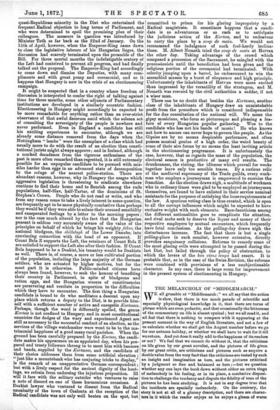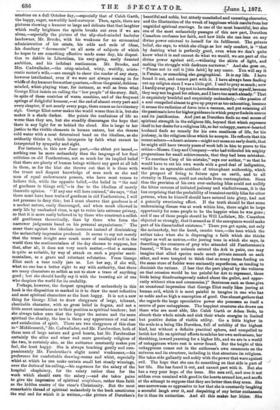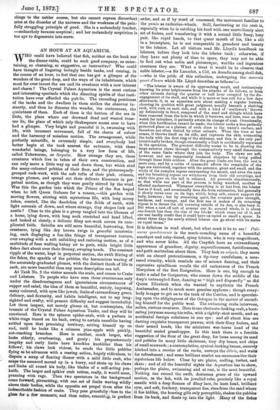THE MELANCHOLY OF "3/LIDDLEMARCIL" TE all grumble at "Dliddlemarch ;
" we all say that the action is slow, that there is too much parade of scientific and especially physiological knowledge in it, that there are turns of phrase which are even pedantic, and that occasionally the bitterness of the commentary on life is almost cynical ; but we all read it, and all feel that there is nothing to compare with it appearing at the present moment in the way of English literature, and not a few of us calculate whether we shall get the August number before we go for our autumn holiday, or whether we shall have to wait for it till we return. And yet does it really add to the happiness of its readers or not? We feel that we cannot do without it, that the criticisms on life given by our great novelist, and the pictures of life given by our great critic, are criticisms and pictures such as acquire a double value from the very fact-that the criticisms are tested by such an insight and imagination as hers, and the pictures criticised by a judgment so fine and balanced as hers ;—but we question whether any one lays the book down without either an extra tinge of melancholy in his feeling, or in its place, a combative disposi- tion to challenge the tendency and dispute the fidelity of tone of the pictures he has been studying. It is not in any degree true that the incidents are specially melancholy. On the contrary, the story is not at all of a gloomy description, and there are charac- ters in it which the reader enjoys as he enjoys a gleam of warm
sunshine on a dull October day,—especially that of Caleb Garth, the happy, eager, unworldly land-surveyor. Then, again, there are pictures showing a humour so large and delicate that that laughter which really brightens the spirits breaks out even if we are alone,—especially the picture of the slip-shod-minded bachelor landowner, Mr. Brooke, with his weakness for an economical -administration of his estate, his odds and ends of ideas, his desultory " documents " on all sorts of subjects of which he hopes to see something effective made some day, his disposi- tion to dabble in Liberalism, his easy-going, easily daunted ambition, and his indolent restlessness. Mr. Brooke, and Mrs. Cadwallader,—the crisp-minded, witty, worldly, aristo- cratic rector's wife,—are enough to cheer the reader of any story, however intellectual, even if we were not always coming in for whiffs of dry humour from other quarters, —from the genial, dubious- minded, whist-playing vicar, for instance, as well as from what George Eliot insists on calling the "low people "of the story. Still, in spite of these snatches of warm sunshine, and of the frequent springs of delightful humour,—at the end of almost every part and every chapter, if not nearly every page, there comes an involuntary sigh. George Eliot never makes the world worse than it is, but she makes it a shade darker. She paints the confusions of life no worse than they are, but she steadily discourages the hope that there is any light for us behind the cloud. She is large in her justice to the visible elements in human nature, but she throws cold water with a most determined hand on the idealism, as she evidently thinks it, which interprets by faith what cannot be interpreted by sympathy and sight.
For instance, in this new June part,—the ablest yet issued,— nothing can be more melancholy than the language of her final criticism on old Featherstone, not so much for its implied belief that there are plenty of human beings without any good at all left in them, as for the hint she throws out that it is those with the truest and deepest knowledge of man such as she and men of equal endowments possess, who have most reason to believe this, while the opposite belief, —the belief in "the soul of goodness in things evil,"—is due to the idealism of merely theoretic opinion. "II any one will here contend," she says, "that there must have been traits of goodness in old Featherstone, I will not presume to deny this ; but I must observe that goodness is of a modest nature, easily discouraged, and when much elbowed in early life by unabashed vices, is apt to retire into extreme privacy, so that it is more easily believed in by those who construct a selfish old gentleman theoretically, than by those who form the narrower judgments based on his personal acquaintance." The sneer there against the idealists increases instead of diminishing the melancholy impression produced. It seems to say not merely that the truest insight sees much more of unalloyed evil in the world than the sentimentalism of the day chooses to suppose, but that, after all, it does not very much matter,—that a sarcasm is quite as suitable, by way of attack on such a popular senti- mentalism, as a grave and reluctant refutation. From George Eliot such a tone really jars us. Let her say, if she will, what no one has a better right to say with authority, that there are many characters so selfish as not to show a trace of anything good ; but she should hardly say it with the taunting air of one who despises the world for its credulity.
Perhaps, however, the deepest symptom of melancholy in this book is the disposition so marked in it to draw the most reflective and most spiritual characters as the least happy. It is not a new thing for George Eliot to draw clergymen of large, tolerant, charitable character, with no great belief in dogma, and not a little secret uneasiness as to their position as spiritual teachers ; but she always takes care that the larger the nature and the more spiritual the charity, the less is there any appearance of real rest and satisfaction of spirit. There are two clergymen of this class in" Middlemarch," Mr. Cadwallader, and Mr. Farebrother, both of them men of large nature and good hearts, but Mr. Farebrother certainly the abler and wiser and more genuinely religious of the two, is certainly also, as the authoress constantly makes you feel, the least happy. She is always touching gently and com- passionately Mr. Farebrother's slight moral weaknesses,—his preference for comfortable drawing-rooms and whist, especially whist at which he can make certain small but steady winnings, over the duties of his calling,—his eagerness for the salary of the hospital chaplaincy, for the salary rather than for the work which should earn the salary ;—and she takes pains to give the impression of spiritual wistfulness, rather than faith as the hidden centre of the vicar's Christianity. J3ut the most remarkable thread of spiritual melancholy in the book constitutes the real end for which it is written,----the picture of Dorothea's
beautiful and noble, but utterly unsatisfied and unseating character, and the illustration of the wreck of happiness which results from her unguided spiritual cravings. In one of the moat beautiful, but also one of the most melancholy passages of this new part, Dorothea Casaubon confesses her faith, and how little she can lean on any divine power external to herself for its fulfilment. The private belief, she says, to which she clings as her only comfort, is "that by desiring what is perfectly ,good, even when we don't quite know what it is and cannot do what we would, we are part of the divine power against evil,—widening the skirts of light, and making the struggle with darkness narrower." And she goes on, "Please not to call it [this faith] by any name. You will say it is Persian, or something else geographical. It is my life. I have found it out, and cannot part with it. I have always been finding out my religion since I was a little girl. I used to pray so much; now I hardly ever pray. I try not to have desires merely for myself, because they may not be good for others, and I have too much already." That is exquisitely truthful and exquisitely melancholy,----the passion of a soul compelled almost to give up prayer as too exhausting, because it seems the radiation of force into a vacuum, and yet retaining all the passionate love for higher guidance in which prayer finds its source and its justification. And just as Dorothea finds no real access of spiritual strength in the religious life, beyond that which expresses itself in her desire for a religious life, so her unhappy, narrow-hearted husband finds no remedy for his own smallness of life, for his jealousy, in the religious ideas which he accepts. He reflects that his recent seizure—a heart-seizure—might not mean an early death, that he might still have twenty years of work left in him to prove to the critics—Messrs. Carp and Company—who had ridiculed his mighty preparations for small achievements, that they had been mistaken. "To convince Carp of his mistake," says our author, " so that he would have to eat his own words with a good deal of indigestion, would be an agreeable accident of triumphant authorship, which the prospect of living to future ages on earth, and to all eternity in Heaven, could not exclude from contemplation. Since thus the prevision of his own ever-enduring bliss could not nullify the bitter savours of irritated jealousy and vindictiveness, it is the less surprising that the probability of transient earthly bliss for other persons, when he himself should have entered into glory, had not a potently sweetening effect. If the truth should be that some undermining disease was at work within him, there might be large opportunity for some people to be the happier when he was gone ; and if one of those people should be Will Ladislaw, Mr. Casaubon objected so strongly, that it seemed as if the annoyance would make part of his disembodied existence." There you get again, not only the melancholy, but the harsh, caustic tone,—the tone which the author takes when she is disparaging a faith which she thinks vulgar as well as untrue,—the jeering tone in which she says, in describing the creatures of prey who attended old Featherstone's funeral, "When the animals entered the Ark in pairs, one may imagine that allied species made much private remark on each other, and were tempted to think that so many forms feeding on the same store of fodder were eminently superfluous, as tending to diminish the rations. (I fear that the part played by the vultures on that occasion would be too painful for Art to represent, those birds being disadvantageously naked about the gullet, and appar- ently without rites and ceremonies.)" Sentences such as these give an occasional impression that George Eliot really likes jeering at human evil, which it is most painful to imagine in one who has so noble and so high a conception of good. One almost gathers that she regards the large speculative power she possesses as itself a source of pure unhappiness. The happiest creatures she draws are those who are most able, like Caleb Garth or Adam Bede, to absorb their whole minds and sink their whole energies in limited but positive duties of visible utility. Go a little higher in the scale to a being like Dorothea, full of nobility of the highest kind, but without a definite practical sphere, and compelled to lavish her life on spiritual efforts to subdue her own enthusiasm, her throbbing, inward yearning for a higher life, and we are in a world of unhappiness where rest is never found. But the height of this unhappiness comes out in the authoress's own comments on the universe and its structure, including in that structure its religions. She takes side gallantly and nobly with the power that wars against evil. The hope that she can do something on that side is part of her life. She has found it out, and cannot part with it. But she has a very poor hope of the issue. She sees evil, and sees it not seldom even unmixed with good in the hearts around her, and scoffs at the attempt to suppose that they are better than they seem. She sees narrowness so oppressive to her that she is constantly laughing a scornful laugh over it, and despairing of any better euthanasia for it than its extinction. And all this makes her bitter. She
clings to the nobler course, but she cannot repress discordant cries at the disorder of the universe and the weakness of the pain- fully struggling principle of good. She is a melancholy teacher, —melancholy because sceptical ; and her melancholy scepticism is too apt to degenerate into scorn.




































 Previous page
Previous page